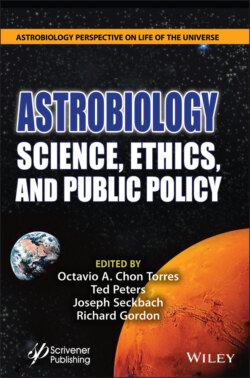Читать книгу Astrobiology - Группа авторов - Страница 45
2.4.3 What is Our Responsibility Toward Superior ETI or Even Post-Biological Intelligence?
ОглавлениеAmong the array of possible futures, intellectually superior ETI we encounter could be hostile, peaceful, or even benevolent. In all cases, our inherited Enlightenment values would require that we treat them with dignity. If hostile, we earthlings might find ourselves enslaved to the superior extraterrestrials. We Homo sapiens are certainly not ready to develop a slave morality; yet a ratiocentric ethic would mandate protocols for slavelike behavior on our part. We might find ourselves relating to superior ETI just as our pets on Earth relate to us.
What would be our responsibility should intellectually superior aliens turn out to be altruistic, even salvific? This scenario of salvation coming to Earth from another planet has already risen to mythical status in our culture [2.56]. Here’s the logic of the ETI myth. Because we on Earth have not yet achieved the level of rationality necessary to see that international war and ecological degradation are inescapably self-destructive, we could learn from ETI more advanced than we. “All technological civilizations that already have passed through their technological adolescence and have avoided their self-destruction…must have developed ethical rules to extend their societal life expectancy,” says Guillermo Lemarchand [2.40]. Because they are beyond war, spacelings can help earthlings get beyond war [2.57] [2.66]. If ETI saves Earth from self-destructive habits such as war or even ecocide, might gratitude be a fitting response?
In short, we should treat superior ETIs with dignity, respecting and even caring for their welfare. If they are hostile and enslave us, we should invoke an appropriate slave morality that respects their superior minds and maintains their dignity. If ETI are peaceful toward us and open up avenues of conversation and commerce, then the principles of justice and the striving to maintain peace should be obtained. If out of their superior wisdom and altruistic motives ETI seek to better our life here on Earth, we should accept the gifts they bring and respond with an attitude of gratitude.
Now, what would be our responsibility if superior ETI turn out to be postbiological? This is a reasonable speculation, given how here on Earth we are already imagining a posthuman scenario that leads to merging humanity with technology as the next stage of our human evolution. Transhumanism, also known as Humanity Plus (H+), is calling us forward. Our mental lives in the future may take place within a computer or on the internet. What we have previously known as Homo sapiens will be replaced by Homo cyberneticus. “As humanism freed us from the chains of superstition, let transhumanism free us from our biological chains” [2.95]. The terms “posthuman” and “postbiological” refer to who we might become if the transhumanists among us achieve their goals.
Might a race of extraterrestrials have already arrived at the posthuman and postbiological stage [2.60]? Templeton Prize winning astrophysicist Martin Rees engages this scenario. “The most likely and durable form of life may be machines whose creators had long ago been usurped or become extinct” [2.72]. In outer space we earthlings may meet our own posthuman future.
To make it more complicated, we can speculate that extraterrestrial post-biological intelligence might not even take an individual form. It might be communal, at least according to Eric Korpela. “I will attempt to dispense with terms such as civilization and species, as such terms presume, to some extent, that ETI will be like us: organized groups of independent biological organisms…. the universe may surprise us. The most common type of ‘civilization’ might consist of a single electronic intelligence” [2.39].
At this point, a subtle shift away from intelligence toward consciousness requires our attention. Philosopher Susan Schneider, a recent holder of the Baruch S. Blumberg NASA/Library of Congress Chair in Astrobiology, acknowledges that “the most advanced alien civilizations will likely be populated by forms of SAI (Super Artificial Intelligence)” [2.76]. What might this imply for the astroethicist? We observe that we have no moral compunction to allow our laptop computer battery to run down and render it nonfunctional. Our electronic computers may appear intelligent; yet they possess no intrinsic value, no dignity. We earthlings would be justified in treating extraterrestrial intelligence without conscious selfhood within a framework of instrumental value.
Table 2.1 Ethics for inferior, peer, and superior ETI.
| Inferior ETI | Peer ETI hostile | Peer ETI peaceful | Sup ETI hostile | Sup ETI peaceful | Sup ETI salvific | |
| Astroethics? | Respect/Care | Dignity | Dignity | Dignity | Dignity | Dignity |
Conscious selfhood adds something well beyond intelligence alone, observes Schneider. “Whether SAI is conscious is key to how we should value postbiological existence…. Consciousness is the philosophical cornerstone here, being a necessary condition on being a self or person, in my view” [2.76]. Unless extraterrestrial intelligence is packaged in a self or a person, we earthlings need not ascribe intrinsic value or treat it with dignity. Before we can determine our astroethical responsibility to an intelligent machine on an exoplanet, we will have to ask it whether it is a self or a person.
A transplanetary community of intelligent persons would warrant an astroethic of responsibility that works out of a vision of a galactic common good (Table 2.1).
